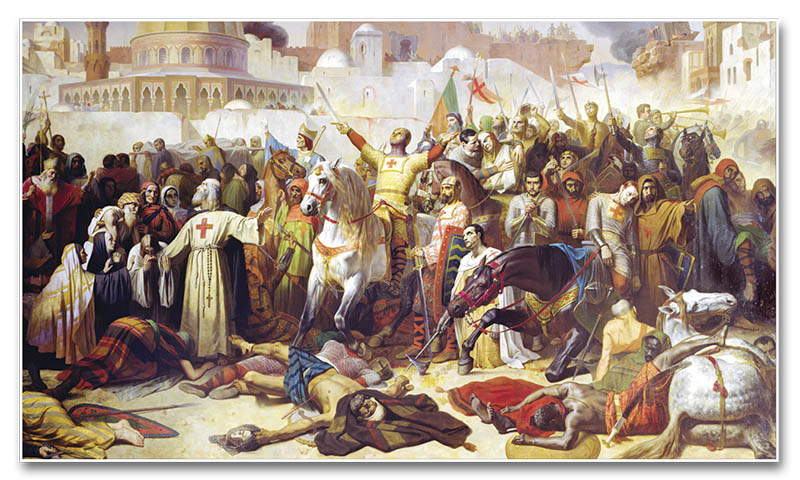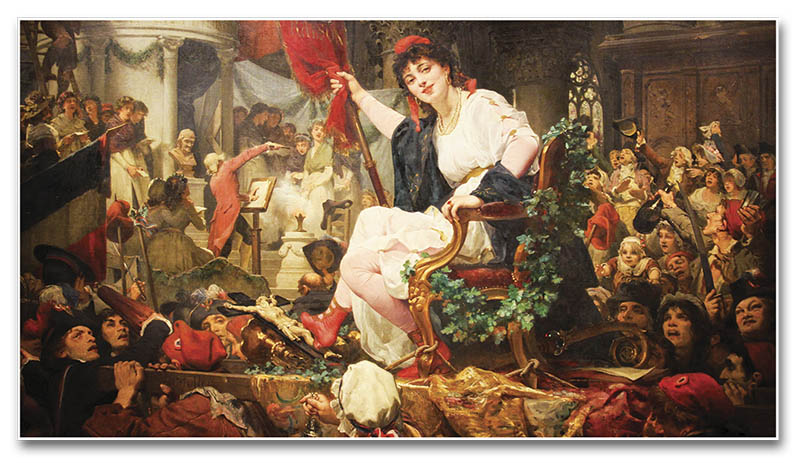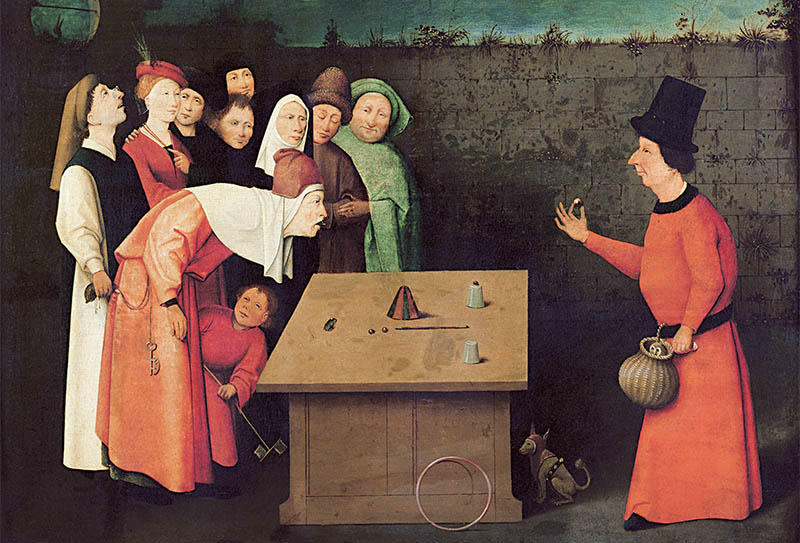In one of his famous brilliant quotes, Joseph De Maistre makes the following analogy: “False opinions are like false money, originally struck by criminals and thereafter circulated by honest people, who perpetuate the crime without knowing what they are doing.”1 These “coins”, in general, have a name: sophisms.
Sophistry is flawed reasoning. Although we may err any number of times, from the logical point of view this happens in only two ways: either by reasoning wrongly with correct information, or correctly with false information. But we cannot conclude that every error in thought is a sophism. For this to occur, one more element is needed: bad faith. Now, many construct false syllogisms with the explicit intention of deceiving. But even more harmful are those who turn themselves into propagators of error, without being fully aware of it. Hence, the accuracy of the analogy with the counterfeit coin, pointed out by the celebrated ultramontane author.
This leads me to believe that, if the reader is surprised to learn of this malady, perhaps he will be even more shocked to know that he is possibly suffering from it… So in order to prevent – or cure – the disease, I will briefly list five of the most common sophisms of the contemporary world, turning the pen into a scalpel and Logic into Medicine.
Fanatics of anti-fanaticism
It was a drizzly day when a priest told me a curious story: he was talking to a man who claimed to be a good Catholic. The cleric, gifted with a privileged psychological sense, became suspicious: “I see… But, just out of curiosity, do you go to Mass every Sunday?” The answer came with disconcerting assurance: “Oh, not to that point, Father; I am Catholic, but not a fanatic!”
I was intrigued… In the past, the criteria for receiving the epithet of fanatic seemed somewhat more demanding. Well, things change with time; perhaps a review of the concepts was in order. Resorting to a good dictionary, I found the following definition under the entry for fanaticism: “Obsessive religious zeal that can lead to extremes of intolerance.”2
“Extremes.” It seems to me that therein lies the crux of the problem. Nowadays, to be a fanatic it is enough to hold an idea with conviction and have an opponent that contradicts it. Because, as soon as there is a counterpoint, there are two extremes; and where there are extremes, in the mediocre conception of contemporary man, there is extremism or, better, fundamentalism. Whoever vigorously sustains a position – any position – is branded a fanatic. Therefore, the proponent of the truth will also be an extremist-fanatic.
Then all human knowledge – precisely because it is based on truth – enters into agony. It begins with arithmetic: someone defends that 3 plus 3 equals 6; another opposes him, announcing that 3 and 3 are 2; an extreme anti-extremist enters, takes the average and affirms that 3 and 3 are 4. Here, we see that the casket is already being prepared for the exact sciences…
Another case: atheists believe – because belief is a necessity – that God does not exist; the Church preaches that He does exist. If we decide to escape “fanaticism,” we will have to reconcile the two currents: God half-exists. This, I believe, would be the graveyard of all ideologies.
The problem lies not in being an extremist according to today’s interpretation of the word – to be decisive in taking a position. It lies, rather, in embracing a false extreme. Or, maybe worse – to use the idolized “maybe” of the fanatics of anti-fanaticism – in being fiercely opposed to taking any side.
Oh, anti-fanaticism, how many fanaticisms have you produced?
Someone might ask: “But what about the principle that virtue lies in the middle?” I reply: it should be made clear that this Aristotelian maxim adopted by St. Thomas Aquinas is not absolute, firstly because it does not apply to the theological virtues. Moreover, the Angelic Doctor3 explains that, even for the cardinal virtues, it applies only in a certain sense, insofar as these virtues are situated between two opposing vices, generally the excesses and the deficiency of the due measure, as happens, for example, with bravery, which is found between cowardice and temerity. Every virtue is indeed an extreme, insofar as it fully conforms to right reason, in opposition to the vices, which diverge from it. It would be ridiculous to complain that a judge is being too just, or that a politician has been too honest…

A circle with four corners
“I am Catholic, but I am not a fanatic.” The phrase still echoes in my mind, immediately evoking another analogous and equally widespread expression: “non-practising Catholic.”
One wonders what these people mean by Catholic. If the qualification corresponded to a professional position or honorific title, which one can hold without having to exercise it, or, who knows, if it simply designated one who believes in the dogmas, perhaps they would be right. It would be the so-called “IBGE [Brazilian Institute of Geography and Statistics] Catholics” that have been spoken of recently. However, Martin Luther has already done the favour of obliging the Church to clarify for future centuries that whoever believes that only faith, without works, is necessary, is a heretic.
A Catholic in the strict sense is, by definition, someone who practises the Catholic religion. Now, what is a Catholic who does not practise? I have no idea…
This brings to mind a Latin expression from the catalogue of sophisms, called contradictio in terminis, a contradiction in terms, which consists in combining two mutually exclusive realities. A square circle, for instance, contains two mutually exclusive elements, because the circular shape presupposes the absence of angles.
Moreover, our beloved mathematics attests to this: 2 is equal to 2. Therefore, 2 minus 2 equals 0. In the same way: Catholic is equal to practising Catholicism; Catholic minus practising Catholicism is equal to 0.
There is just one God
There was a time when circus beasts were fed on the flesh of men convinced of their religious ideals; bonfires in overflowing arenas had ardent faith as their fuel; swords drew sparks from others in defence of personal beliefs. But those times are over. Or rather, they have been finished with.
So that men would no longer immolate themselves for the truth, they chose to immolate the truth on the altar of conciliation.
“There is one God” (Eph 4:6). The monotheistic religions believe in only one God; therefore, they believe in the same Divinity. “God is one” is a phrase often heard in the most diverse places. This is one of the sacrificial daggers of truth.

Indeed, if Logic were a person, I believe he would have lain dead long ago. And hearing such a sophism, he would certainly have turned over in his grave – turned over twice, since this dagger has attacked a basic syllogistic rule, which demands that the words in the premises not be given different values. Analysing the phrases: “to believe in one God” and “to believe in the same God”, we see that they are two different things.
St. Paul himself does not assert pure and simply that “there is one God.” Immediately prior he states: “There is one Lord, one faith, one Baptism” (Eph 4:5-6). Let me translate what the Apostle says in a few words: it follows from the existence of one God and Lord that there is one truth about Him – one faith – and one practice conformed to this truth – one Baptism.
The same Supreme Being cannot simultaneously ordain precepts that are mutually exclusive: to forbid and to permit the eating of pork; to approve and to censure polygamy or divorce; to accept and to repudiate the worship of statues; to proclaim, on the one hand, that there is an eternal reward and punishment and, on the other, that there is no life after death, or that we are subject to reincarnation. God cannot be in contradiction with Himself.
Truth is one and immutable. Where there are different truths, there are two possibilities: either none of the truths or only one is… true. If there is only one God, which is concluded by natural reason, there can only be one authentic doctrine regarding Him.
Beware of those counterfeit coins
At the beginning, I mentioned de Maistre’s consideration of fallacious opinions: they are like counterfeit coins. Well, I have left the two most common ones for the end of this article.
According to the opinion of a statesman of the stature of Metternich – which may sound like heresy to contemporary ears, but every truth has its nuances – “two words are sufficient to create evil; two words which, by virtue of being emptied of all practical meaning, captivate dreamers in a vacuum. These words are liberty and equality.”4
Let us begin with the first. It has, of course, an inestimable value when true. But most of the coins circulating under that name are not authentic.
How to identify the one in your pocket? It is as simple as reading the inscription written on it. The term liberty, continues Metternich, is like religion. What creed is it referring to? In the same way, what liberty is being referred to? What is meant by liberty?

The Institutes of Justinian5 state that liberty consists of the faculty to do whatever one wants, except what the law forbids. Any society with a minimum of civilization will impose limits on its citizens. Otherwise, chaos will ensue. But what are the boundaries of true freedom?
If on your coin it says “my freedom ends where the other’s begins,” know that it is a forgery, because at the bottom of this idea is that morality is based on a mere accord of peaceful coexistence, with no foundation in absolute values. The benchmark becomes simply convenience itself. Forgive the truculence of the examples: Do you want to finish with your health by committing every kind of excess? Be my guest, as long as you don’t affect my life. Do you want to break up your family? If its members are not offended, what’s the problem? You choose to kill yourself? Go ahead, just don’t create any inconvenience for me doing it… Where will we end up?
Liberty does not consist in being a slave to one’s own instincts and passions, but in our dominion over what we hold most dear: ourselves. It is the coin with which we buy Heaven, for it gives us the possibility of acquiring merit; when it is not counterfeit or vile, it is “the glorious liberty of the children of God” (Rom 8:21).
Nevertheless, since this concept is usually not well defined in minds, it is easily transformed into a kind of demagogic and ethereal slogan that everyone loves, defends and seeks… without knowing exactly what it means. This is what Logic calls equivocality, that is to say, using a word with several different meanings in order to take your reasoning wherever you want it to go.
What would Terence say?
It remains to speak of equality, for which I would like to refer to a brilliant explanation by Dr. Plinio Corrêa de Oliveira.6 How many times have we heard: “Justice demands that, from the beginning of life, everyone should have the same opportunities.” Is this assertion true?
Let us take the fundamental cell of society: the family. There is a natural factor, mysterious and sacred, which is intimately linked to it: biological heredity. It is evident that some families are better gifted, from this point of view, than others.
There are families in which the artistic sense, or the gift of speech, or medical acumen, or the aptitude for business is transmitted through many generations. Nature itself – and therefore God, who is its Author – invalidates, through the family, the principle of equality at the starting point. Now, why the concern to artificially impose it on property, on culture and on so many other fields?
One of the famous Roman orators, Terence by name, spoke in defense of an idea that later became commonplace in the following adage: “Duo cum faciunt idem non est idem.”7 Once again, the ancients were right. Even if everyone did and thought the same thing, they would do and think it in a different way.
I don’t know what title to give this article
Coming to the end of this dissertation, a difficulty arose: what title should I give it? I thought of calling it Current Problems, but the formulation was too hackneyed. It would be the umpteenth article – numbering well into the hundreds – to use this pompous name to designate the most common phenomenon of our days: problems.
“Heretics!” I cried, based on the witty way Chesterton defined them: “A man whose view of things has the hardihood to differ from mine.”8 In fact, since there are no longer any absolute truths, this is the only criterion that is still used to label someone with the solemn epithet.
Unsatisfied, I resorted to others: Does 2+2 Still Equal 4? or perhaps The Last Time They Sacrificed Truth, It Rose Again on the Third Day, but nothing seemed to fit the article in its entirety.
Lacking inspiration, I gave up on giving it a title. It seemed the easiest part and yet… There are certain attitudes of soul so illogical that it really becomes difficult to qualify them. And so I leave to the reader the choice of the title. ◊
In the featured photo: “The Conjuror”, by Hieronymus Bosch – Museum of Saint-Germain-en-Laye (France)
Article taken from the Heralds of the Gospel magazine, #172.
Notes
1 DE MAISTRE, Joseph. Les soirées de Saint Pétersbourg. 2.ed. Lyon: J. B. Pélagaud, 1870, t.I, p.24.
2 FANATISMO. In: HOUAISS, Antônio; VILLAR, Mauro de Salles. Grande Dicionário Houaiss da Língua Portuguesa. Rio de Janeiro: Objetiva, 2001.
3 Cf. ST. THOMAS AQUINAS. Summa Theologiae. I-II, q.64, a.1; a.4.
4 DECAUX, Alain. Metternich, “cocher de l’Europe”. In: Historia. Paris. N.318 (maio, 1973); p.132.
5 Cf. JUSTINIAN. Institutas do Imperador Justiniano. Bauru: EDIPRO, 2001, p.25.
6 Cf. CORRÊA DE OLIVEIRA, Plinio. O problema dos 4 irmãos [The Problems of the Four Brothers]. In: Folha de São Paulo. São Paulo. Year XLVIII. N.14.500 (Feb. 26, 1969); p.4.
7 From the Latin: “When two do the same thing, it is not the same.”
8 CHESTERTON, Gilbert Keith. Heretics. In: The Collected Works of G. K. Chesterton vol. 1. San Francisco: Ignatius Press, 1986, p.46.

